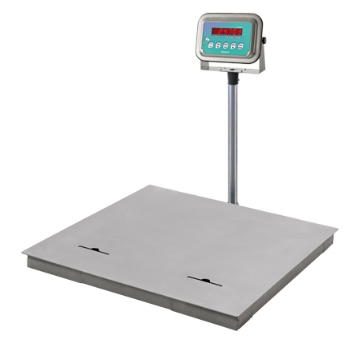Floor scales are essential tools used in various industries to accurately measure the weight of heavy objects, materials, or products. They are designed to be sturdy, durable, and capable of withstanding heavy loads. Floor scales are commonly used in industries such as manufacturing, logistics, agriculture, construction, and more.
Here are some of our stainless steel floor scale for industrial use:
PO
- AISI 304 Stainless Steel Structure
- Stainless Steel Junction Box
- 4 Shear Beam Load Cell
- Accuracy Class C3 (OIML R60)


Key points to consider when looking for a floor scale:
Capacity and Accuracy: Choose a floor scale with a capacity that suits your needs. Consider the maximum weight of the objects you’ll be weighing and ensure the scale’s capacity exceeds this weight. Also, look for scales with high accuracy to ensure precise measurements.
Platform Size: The size of the scale’s platform should be large enough to accommodate the objects you’ll be weighing. Consider the dimensions of the objects and the available space in your facility.
Construction and Durability: Industrial environments can be harsh, so choose a floor scale made from sturdy materials like stainless steel. Look for scales that are resistant to wear, corrosion, and impact to ensure a long lifespan.
Load Cells: These are the components that measure the weight on the scale. High-quality load cells are crucial for accurate and consistent measurements. Make sure the scale has reliable load cells that can handle heavy loads.
Display and Readability: The scale should have a clear and easy-to-read display, especially if operators need to read measurements from a distance. Some scales also offer remote displays for added convenience.
Units and Connectivity: Ensure the scale can display measurements in the units you require (e.g., pounds, kilograms). If you need to integrate the scale with other systems, consider models that offer connectivity options such as RS232, RS485, Ethernet TCP/IP, Modbus RTU, Profibus DP, Profinet IO, and many more.
Environmental Considerations: If your industrial environment involves exposure to moisture, dust, or chemicals, choose a scale that is designed to handle these conditions. Look for scales with appropriate ingress protection (IP) ratings.
Calibration and Maintenance: Regular calibration is essential to maintain accurate measurements. Consider whether the scale’s calibration process is straightforward and whether the manufacturer provides support or services.
Legal Compliance: In some industries, such as food and pharmaceuticals, legal regulations may require scales to meet specific standards. Make sure the scale you choose is compliant with relevant regulations.
Price and Warranty: Compare prices and warranties from different manufacturers. While cost is a factor, prioritize quality and reliability to avoid frequent replacements or repairs.
Additional Features: Our floor scales come with additional features like data logging, tare functions, piece counting, totalizer and many more. Evaluate these features based on your specific needs.
Remember that choosing the right floor scale for your industry requires careful consideration of your unique requirements and operational environment. It’s a good idea to consult with Panatronik who specialize in such equipment to ensure you make an informed decision.

